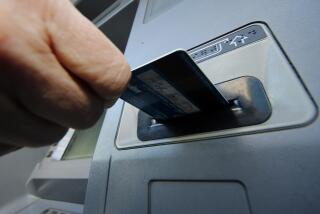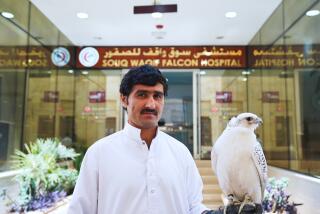With a Scholarly Touch, Citicorp Makes Its Pitch for Islamic Investors
- Share via
MANAMA, Bahrain — The sight of Islamic scholars poring over investment proposals offered by the largest U.S. bank may seem bizarre to Citicorp’s well-heeled clientele.
The scene could become commonplace, however, as more foreign banks court the scholars--known as “guardians of the faith” and organized into Sharia boards--to guide them through the pitfalls of Islamic finance.
In July, Citibank became the first Western financial institution to found an Islamic bank in Bahrain to cater to an increasing appetite for religiously sanctioned investments.
Other large banks are entering the race.
ABN Amro, the Netherlands’ largest bank, for example, is setting up an Islamic department in its Bahrain representative branch later this year.
Meanwhile, the Manama, Bahrain-based Arab Banking Corp. is upgrading its Islamic department into a separate bank to better compete with rivals. The corporation said the Islamic unit will open early next year with a paid-up capital of $75 million.
Bankers say the creation of Citi Islamic Investment Bank, or CIIB, by Citibank could act as a catalyst to the further growth of Islamic banking and widen the range of services.
It will also give credibility to an industry so far largely dominated by banks in the Persian Gulf, Egypt and Malaysia.
CIIB’s operation will be overseen by ethics committees known as Sharia boards and versed in religious laws. Their task is to scrutinize investment proposals for any deviation from the path dictated by the Muslim holy book, the Koran.
Islam, for example, forbids interest as usury since it does not consider money a commodity. Banks, therefore, must make sure interest is neither paid nor received by them or their clients. Instead, money must be invested in--not lent to--enterprises that benefit society. As such, investors’ risk is greater.
*
Islamic banks have devised several ways clients can make money while complying with the stricture on interest charges.
They now offer an array of financial instruments, ranging from loans, trade and venture finance to leasing and currency swaps. Investments in equities is becoming popular.
Citibank’s Islamic unit says it is determined to initiate an innovative era in Islamic banking.
CIIB Chairman Mohammed al-Shroogi said the bank will offer financial advisory services and sell products to help clients manage liquidity, private portfolios and professional assets.
“Our aim would be to broaden the market,” said Shafqat Memon, CIIB’s managing director. “Islamic banking is an area which is growing. It is an additional service to our clients. Because of our commitment to this region, we have to be involved in this industry.”
Memon said the bank will try to reach out to markets outside the Persian Gulf.
“There are Islamic assets available in so many markets which can probably be brought in more easily by the Citibank than anybody else.”
Malaysia, where Islamic banking has already taken root, and other Asian countries such as Indonesia, home to world’s largest Muslim population, can be fertile ground for Islamic banks.
Citibank’s foray into the Gulf gives it access to a ready pool of cash from wealthy Arabs seeking Islamic investments, bankers said.
“It is there right on people’s doorsteps,” said Duncan Smith, head of the Islamic Investment Banking Unit owned by the London-based United Bank of Kuwait. “They will therefore be able to compete directly with Islamic banks in the Gulf for private clients’ deposits.”
Abdelhak El-Kafsi, who runs ABC’s Islamic banking division in Bahrain, said he is not worried about Western banks entering the market. “Competition ensures a better service for clients,” he said.
As competition gains pace, investors will have access to a wider choice of products. Trade finance has traditionally been the backbone of Islamic banking.
This is changing as a rise in the number of banks limits the scope for profits from short-term trade-related investments.
“The growth of Islamic banking is . . . the result of economic growth in the Islamic world fueled primarily by oil wealth,” says Adnan Al-Bahr, chairman of International Investor, an Islamic bank based in Kuwait. “It is my belief that Islamic banking will be responsible for managing up to 50% of savings in the Islamic world in the coming five to 10 years.”
This potential has not been lost on Western institutions.
Kleinwort Benson Plc, the London-based investment-banking subsidiary of Germany’s Dresdner Bank AG, joined with Bahrain-based Islamic Investment Company of the Gulf in May to launch a commodity fund to invest in base metals.
Stella Cox, in charge of Kleinwort Benson’s Islamic banking in London, said she is confident the al-Meezan fund will attract at least $30 million. Kleinwort Benson already manages $1 billion from Islamic investors, she said.
*
Investment bank Robert Fleming & Co. in February launched its Oasis equity fund tailored to Islamic investors.
Islamic banks in some parts of the world compete effectively with conventional rivals. Islamic banks in Malaysia, for example, count many non-Muslim Chinese among their clients, said Smith at the United Bank of Kuwait.
From a handful of institutions 20 years ago, Islamic banking has expanded to more than 100 banks in 40 countries. The largest is Alrajhi Banking and Investment Group of Saudi Arabia, which manages $7.6 billion in assets. Bankers say Islamic banks control at least $50 billion in assets.
The 1970s oil price boom created many millionaire Muslims in the Persian Gulf region. Some of the wealthy individuals seek Islamic investments for religious reasons. Others opt for Islamic banks simply because they can at times offer better returns.
“The prime motivation is not making profits, but pleasing God,” said Mohammed Ayub Mohammad, managing director of Dubai Islamic Bank.
When it comes to investments, Sharia boards’ expertise can be vital to the banks.
For instance, buying shares in hotels and airlines may sound innocent, but not to Islamic legal experts. They argue revenue from those businesses are ill-gained because hotels and airlines often sell alcohol, which the Muslim faith bans. Dealings with companies that earn interest on investments is also forbidden.
Islamic banks act as intermediaries between borrowers and depositors who lend money on a profit-sharing basis.
Depositors, banks and fund users share all the risks and benefits. The bank’s returns are linked to the financial success of the client rather than on the receipt of a steady stream of interest payments.
Depositors are at risk in that they do not get a steady income regardless of the success or failure of the borrowers.
Islamic banks therefore must offer a variety of services and maintain a global portfolio to minimize risks.
One popular technique is Murabaha, used mainly in trade finance. The bank buys the goods in question from suppliers and delivers them to the customer at an agreed marked-up price. The gains are linked to international interest rates, although the two sides must avoid directly linking the mark-up to interest rates when drawing up the documentation.
Then there is Mudaraba, which requires people with excess money to deposit it with skilled professionals--Islamic banks--so the money can be put to good use. This led to the creation of several Islamic investment funds. A portion of the profits are returned to the investors; the banks manage the funds for a fee.
Ijara is similar to leasing equipment and machinery in the West. Banks lease their assets to third parties for a specified rent. The banks then take a management fee and pay investors the balance.
Another technique similar to venture capital is Musharaka. Partners invest in a project and manage it jointly. Profits and losses are split.
Islamic banks also deal in currency exchange and swaps. Some transactions common in the West, such as currency futures or forward trading, are off-limits because they are based on the trading of currency as a commodity. That is inconsistent with Islamic banking principles. Swaps are welcome if they involve a simple exchange of one currency for another at agreed spot exchange rates.
Islamic banks in Iran offer products unique to that country and rejected by other Muslim states. In what amounts to little more than gambling, Iranian banks take cash from depositors and put their names into a raffle. The winners may win an apartment, a car or even cash.
More to Read
Inside the business of entertainment
The Wide Shot brings you news, analysis and insights on everything from streaming wars to production — and what it all means for the future.
You may occasionally receive promotional content from the Los Angeles Times.









